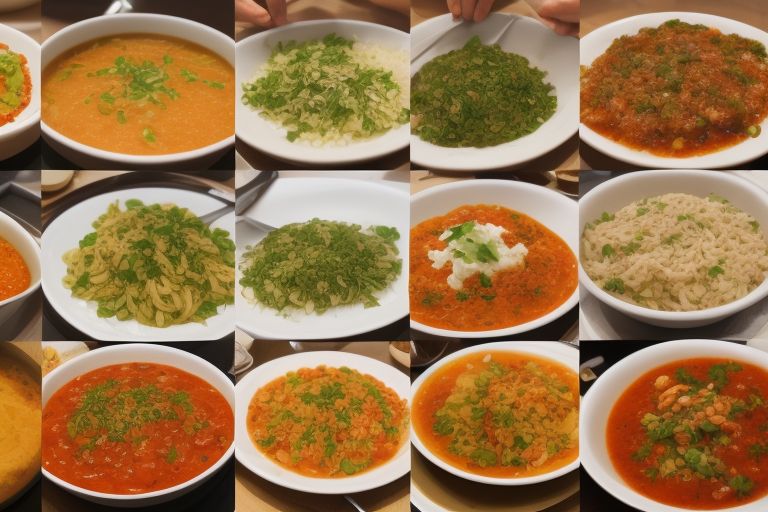
Greek cuisine has a rich history that dates back thousands of years. Influenced by its Mediterranean location and the various civilizations that have called Greece home, Greek food is a unique blend of flavors, textures, and colors. In this article, we will explore the diverse and delicious world of Greek cuisine.
1. The Influence of Geography
Situated at the crossroads of Europe, Asia, and Africa, Greece has been influenced by a wide range of cultures and cuisines. The country’s location on the Mediterranean Sea has also played a significant role in shaping its culinary traditions. The use of olive oil, fresh herbs, and seafood is central to Greek cooking and is a reflection of the country’s bountiful natural resources.
2. The Importance of Fresh Ingredients
Greek cuisine is known for its emphasis on fresh, high-quality ingredients. From juicy tomatoes and crisp cucumbers to tender lamb and creamy feta cheese, Greek dishes are bursting with the flavors of the Mediterranean. Locally sourced produce and meats are fundamental to Greek cooking, and the country’s climate allows for a wide variety of fruits, vegetables, and herbs to thrive.
3. The Role of Olive Oil
Olive oil is a staple in Greek cuisine and is used in nearly every dish. Known for its health benefits and rich flavor, Greek olive oil is a key ingredient in everything from salads and marinades to sautés and dressings. The country’s olive groves produce some of the finest olive oil in the world, and Greeks take great pride in their olive oil production.
4. Meze: The Art of Small Plates
Meze, or small plates, are a central part of Greek dining culture. These appetizer-style dishes are meant to be shared with friends and family and are a celebration of the diverse flavors of Greek cuisine. From tzatziki and hummus to dolmades and grilled octopus, meze offers a wide range of tastes and textures that are perfect for sampling and sharing.
5. A Bounty of Seafood
With its long coastline and abundant fishing waters, Greece is a paradise for seafood lovers. Fresh fish, octopus, shrimp, and calamari are staples of Greek cuisine and are often prepared simply to let their natural flavors shine. Grilled, fried, or stewed, Greek seafood dishes are a delight for the senses and a testament to the country’s unique culinary heritage.
6. The Versatility of Greek Cheese
Greek cheese is as diverse as it is delicious, with each region of the country producing its own unique varieties. Feta, perhaps the most well-known Greek cheese, is a creamy and tangy sheep’s milk cheese that is used in salads, pastries, and meat dishes. Other popular Greek cheeses include graviera, kefalotyri, and kasseri, each of which has its own distinct flavor and texture.
7. The Art of Grilling
The Greeks are masters of the grill, and grilled meats play a prominent role in Greek cuisine. Souvlaki, or skewered meat, is a popular street food that can be found throughout Greece. Whether it’s pork, chicken, lamb, or beef, grilled meats are often marinated in olive oil, lemon, and herbs before being cooked to juicy perfection over an open flame. Grilled vegetables, such as eggplant, zucchini, and bell peppers, are also common accompaniments to grilled meats.
8. The Comfort of Stews and Casseroles
Greek cuisine is also known for its hearty stews and casseroles, which are perfect for warming up on a cold winter’s day. Moussaka, a layered dish of eggplant, minced meat, and béchamel sauce, is a favorite comfort food in Greece. Stifado, a rich stew of beef, onions, and spices, is another classic Greek dish that is sure to satisfy any appetite.
9. The Sweet Endings of Greek Desserts
Greek desserts are a sweet and satisfying way to end a meal. Baklava, layers of phyllo pastry filled with nuts and honey, is perhaps the most famous Greek dessert and is enjoyed throughout the country. Loukoumades, deep-fried dough balls drizzled with honey and cinnamon, are another popular sweet treat. Greek yogurt, topped with honey, nuts, or fruit, is a simple and delicious dessert that is a staple in Greek households.
10. The Ritual of Coffee
Coffee plays an important role in Greek culture and is often enjoyed as part of a ritual that dates back centuries. Greek coffee, a strong and rich brew similar to Turkish coffee, is traditionally enjoyed in small cups and sipped slowly. Frappé, a frothy iced coffee made with instant coffee, sugar, and milk, is a popular summer drink in Greece. Whether it’s enjoyed in a bustling café or on a quiet terrace overlooking the sea, coffee is an essential part of Greek life.
11. The Influence of Ancient Greece
Many aspects of modern Greek cuisine can be traced back to ancient Greece, where food and wine played an integral role in daily life. The ancient Greeks were known for their love of wine, olives, and bread, all of which are still central to Greek cuisine today. The use of herbs, spices, and olive oil in cooking can also be linked to the culinary traditions of ancient Greece, where food was seen as a means of nourishing both body and soul.
12. Regional Variations in Greek Cuisine
Greece’s diverse geography and history have led to a wide range of regional variations in Greek cuisine. The mountainous regions of northern Greece are known for hearty meat dishes and rich dairy products, while the islands of the Aegean Sea are famous for their seafood and vegetable-based cuisine. Crete, the largest of the Greek islands, has its own distinct culinary traditions, including the liberal use of herbs and spices in cooking.
13. The Role of Hospitality
Hospitality is a cornerstone of Greek culture, and nowhere is this more evident than in Greek cuisine. Greeks love to share food with friends and family, and no meal is complete without plenty of laughter, conversation, and good company. From festive celebrations to simple gatherings, Greek cuisine is a reflection of the warmth and generosity of the Greek people.
14. A Culinary Journey
Greek cuisine is a vibrant tapestry of flavors, textures, and colors that reflect the country’s rich history and diverse influences. From the salty sea air of the islands to the rugged mountains of the mainland, Greece’s culinary traditions are as varied and intricate as the landscapes that inspire them. Whether you’re savoring a plate of grilled octopus by the sea or sampling meze in a bustling taverna, Greek cuisine is a feast for the senses that will leave you craving more.
15. Conclusion
In conclusion, Greek cuisine is a celebration of the bountiful flavors, textures, and colors of the Mediterranean. Influenced by its rich history, diverse geography, and warm hospitality, Greek food is a melting pot of culinary traditions that has been passed down through generations. Whether you’re dining on fresh seafood by the sea or enjoying a comforting stew in a cozy taverna, Greek cuisine is sure to delight your taste buds and leave you longing for more. Opa!
















